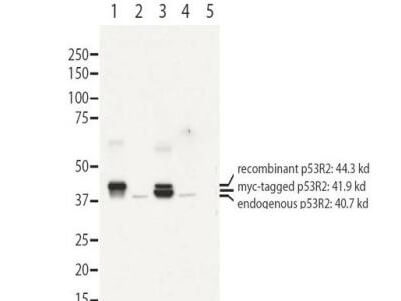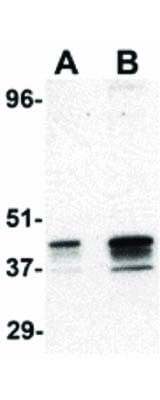Datasheet is currently unavailable. Try again or CONTACT US
RRM2B p53R2 Antibody
Rabbit Polyclonal
2 References
600-401-B67S
600-401-B67
25 µL
100 µg
Liquid (sterile filtered)
Liquid (sterile filtered)
WB, ELISA, IHC
Human
Rabbit
Shipping info:
$50.00 to US & $70.00 to Canada for most products. Final costs are calculated at checkout.
Product Details
Anti-Human RRM2B/p53R2 (RABBIT) Antibody - 600-401-B67
rabbit anti-RRM2B p53R2 antibody, rabbit anti-RRM2B antibody, rabbit anti-p53R2 antibody, Ribonucleoside-diphosphate reductase subunit M2 B, TP53-inducible ribonucleotide reductase M2 B, p53-inducible ribonucleotide reductase small subunit 2-like protein
Rabbit
Polyclonal
IgG
Target Details
RRM2B - View All RRM2B Products
Human
Conjugated Peptide
Anti-Human RRM2B/p53R2 antibody was prepared by repeated immunizations with a synthetic peptide corresponding to a region near the N-terminus of human RRM2B1 protein. A residue of cysteine was added to facilitate coupling.
Anti-Human RRM2B/p53R2 is directed against RRM2B and reacts with the RRM2B from human tissues. Based on sequence we expect this antibody to react as well with RRM2B from other species. Based on 100% homology to the immunizing sequence, one may expect reactivity to chimpanzee and orangutan; based on 93% homology, reactivity to macaque, and 92% to pig and Drosophila.
Application Details
ELISA, WB
IHC
- View References
RRM2B/p53R2 antibody is tested in Western Blot and ELISA and suitable for IP, IHC, and IF. Specific conditions for reactivity should be optimized by the end user. Expect a band approximately 41 kDa in size corresponding to RRM2B1 by western blotting in the appropriate cell lysate or extract.
Formulation
0.82 mg/mL by UV absorbance at 280 nm
0.02 M Potassium Phosphate, 0.15 M Sodium Chloride, pH 7.2
0.01% (w/v) Sodium Azide
None
Shipping & Handling
Dry Ice
Store vial at -20° C prior to opening. Aliquot contents and freeze at -20° C or below for extended storage. Avoid cycles of freezing and thawing. Centrifuge product if not completely clear after standing at room temperature. This product is stable for several weeks at 4° C as an undiluted liquid. Dilute only prior to immediate use.
Expiration date is one (1) year from date of receipt.
RRM2B/p53-R2, or p53-inducible ribonucleotide reductase small subunit 2-like protein, is a member of a broad superfamily of ferritin-like di-iron-carboxylate proteins. The RRM2B protein is an enzyme that catalyzes the conversion of ribonucleotides to deoxyribonucleotides that are essential for DNA synthesis, and is found in all eukaryotes. RRM2B plays a pivotal role in cell survival by repairing damaged DNA in a p53/TP53-dependent manner. It supplies deoxyribonucleotides for DNA repair in cells arrested at G1 or G2. It contains an iron-tyrosyl free radical center required for catalysis, and forms an active ribonucleotide reductase (RNR) complex with RRM1 which is expressed both in resting and proliferating cells in response to DNA damage. It is a heterotetramer with a large (RRM1) subunit, and interacts with p53/TP53. The interaction with RRM1 occurs in response to DNA damage and results in its translocation from cytoplasm to nucleus. It is widely expressed at a high level in skeletal muscle and at a weak level in thymus, and expressed in epithelial dysplasias and squamous cell carcinoma. Defects in RRM2B are the cause of encephalomyopathic mitochondrial depletion syndrome with renal tubulopathy (EMDSRT). Mitochondrial DNA depletion syndrome (MDS) is a clinically heterogeneous group of disorders characterized by a reduction in mitochondrial DNA (mtDNA) copy number. The encephalomyopathic form with renal tubulopathy is presented with various combinations of hypotonia, tubulopathy, seizures, respiratory distress, diarrhea, and lactic acidosis.
Xue et al. (2019). Ribonucleotide reductase subunit M2B deficiency leads to mitochondrial permeability transition pore opening and is associated with aggressive clinicopathologic manifestations of breast cancer. American Journal of Translational Research
Applications
IHC, ICC, Histology; WB, IB, PCA
Chen et al. (2016). Autophagy induction causes a synthetic lethal sensitization to ribonucleotide reductase inhibition in breast cancer cells. Oncotarget
Applications
WB, IB, PCA
This product is for research use only and is not intended for therapeutic or diagnostic applications. Please contact a technical service representative for more information. All products of animal origin manufactured by Rockland Immunochemicals are derived from starting materials of North American origin. Collection was performed in United States Department of Agriculture (USDA) inspected facilities and all materials have been inspected and certified to be free of disease and suitable for exportation. All properties listed are typical characteristics and are not specifications. All suggestions and data are offered in good faith but without guarantee as conditions and methods of use of our products are beyond our control. All claims must be made within 30 days following the date of delivery. The prospective user must determine the suitability of our materials before adopting them on a commercial scale. Suggested uses of our products are not recommendations to use our products in violation of any patent or as a license under any patent of Rockland Immunochemicals, Inc. If you require a commercial license to use this material and do not have one, then return this material, unopened to: Rockland Inc., P.O. BOX 5199, Limerick, Pennsylvania, USA.


